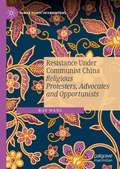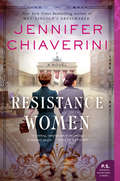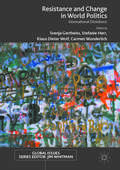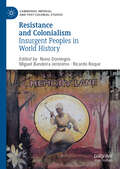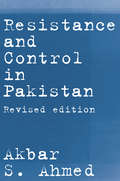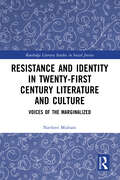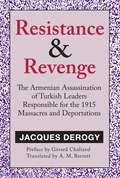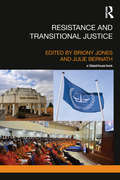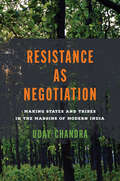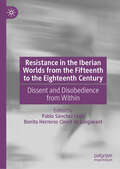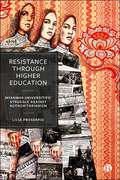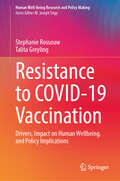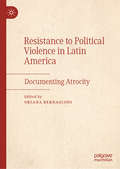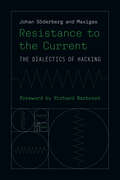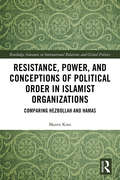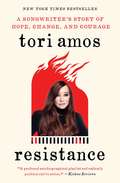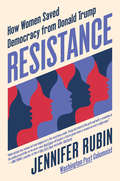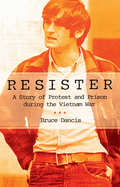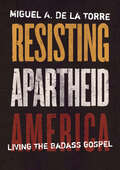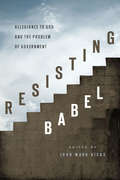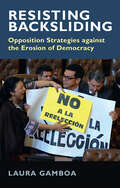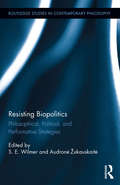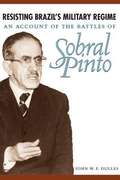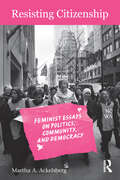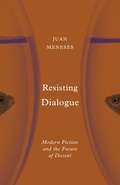- Table View
- List View
Resistance Under Communist China: Religious Protesters, Advocates and Opportunists (Human Rights Interventions)
by Ray WangThis book examines religious activism—Christianity, Buddhism, and Taoism—in China, a powerful atheist state that provides one of the hardest challenges to existing methods of transnational activism. The author focuses on mechanisms used by three kinds of actors: protesters, advocates and opportunists, and uses regional, inter-faith, and international comparisons to understand why some foreign advocates can enter China and engage in illegal aid and missions to empower local activists, while the same groups cannot conduct the same activities in another geographically, economically and politically similar location. The stories in this book demonstrate a more inclusive and bottom-up approach of transnational activism; they challenge the conventional spiral theory paradigm of human rights literature and the narrow views about GONGOs in civil society literature. This new knowledge helps to sustain a more optimistic view and offers an alternative way of promoting human rights in China and countries with similar authoritarian environments.
Resistance Women: A Novel
by Jennifer ChiaveriniFrom the New York Times bestselling author of Mrs. Lincoln’s Dressmaker, an enthralling historical saga that recreates the danger, romance, and sacrifice of an era and brings to life one courageous, passionate American—Mildred Fish Harnack—and her circle of women friends who waged a clandestine battle against Hitler in Nazi Berlin.After Wisconsin graduate student Mildred Fish marries brilliant German economist Arvid Harnack, she accompanies him to his German homeland, where a promising future awaits. In the thriving intellectual culture of 1930s Berlin, the newlyweds create a rich new life filled with love, friendships, and rewarding work—but the rise of a malevolent new political faction inexorably changes their fate. As Adolf Hitler and his Nazi Party wield violence and lies to seize power, Mildred, Arvid, and their friends resolve to resist. Mildred gathers intelligence for her American contacts, including Martha Dodd, the vivacious and very modern daughter of the US ambassador. Her German friends, aspiring author Greta Kuckoff and literature student Sara Weitz, risk their lives to collect information from journalists, military officers, and officials within the highest levels of the Nazi regime. For years, Mildred’s network stealthily fights to bring down the Third Reich from within. But when Nazi radio operatives detect an errant Russian signal, the Harnack resistance cell is exposed, with fatal consequences. Inspired by actual events, Resistance Women is an enthralling, unforgettable story of ordinary people determined to resist the rise of evil, sacrificing their own lives and liberty to fight injustice and defend the oppressed.
Resistance and Change in World Politics
by Klaus Dieter Wolf Svenja Gertheiss Stefanie Herr Carmen WunderlichThis edited volume analyses different forms of resistance against international institutions and charts their success or failure in changing the normative orders embodied in these institutions. Non-state groups and specific states alike advocate alternative global politics, at the same time finding themselves demonized as pariahs and outlaws who disturb established systems of governance. However, over time, some of these actors not only manage to shake off such allegations, but even find their normative convictions accepted by international institutions. This book develops an innovative conceptual framework to understand and explain these processes, using seven cases studies in diverse policy fields; including international security, health, migration, religion and internet politics. This framework demonstrates the importance of coalition-building and strategic framing in order to form a successful resistance and bring change in world politics.
Resistance and Colonialism: Insurgent Peoples in World History (Cambridge Imperial and Post-Colonial Studies Series)
by Ricardo Roque Miguel Bandeira Jerónimo Nuno DomingosThis volume offers a critical re-examination of colonial and anti-colonial resistance imageries and practices in imperial history. It offers a fresh critique of both pejorative and celebratory readings of ‘insurgent peoples’, and it seeks to revitalize the study of ‘resistance’ as an analytical field in the comparative history of Western colonialisms. It explores how to read and (de)code these issues in archival documents – and how to conjugate documental approaches with oral history, indigenous memories, and international histories of empire. The topics explored include runaway slaves and slave rebellions, mutiny and banditry, memories and practices of guerrilla and liberation, diplomatic negotiations and cross-border confrontations, theft, collaboration, and even the subversive effects of nature in colonial projects of labor exploitation.
Resistance and Control in Pakistan
by Akbar S. AhmedHow can people in the West make sense of contemporary unrest in the Muslim world? Is Islamic fundamentalism to be understood purely in religious terms?In Resistance and Control in Pakistan, one of the world's leading authorities on Islam, Akbar S. Ahmed, illuminates what is happening in the Muslim world today and assesses the underlying causes. He does this by telling the dramatic story of the revolt of the Mullah of Waziristan in northwest Pakistan and by placing it within the context of other movements occurring elsewhere in the Islamic world. He also examines the social structure and operative principles in Muslim society and scrutinizes the influence of religion in a society that is undergoing modernization. Till now, there has been little available literature on this topic. This book, written by an eminent scholar with an international reputation fills this gap, giving students of politics, sociology and Asian studies a revealing examination of the Muslim world today.
Resistance and Identity in Twenty-First Century Literature and Culture: Voices of the Marginalized (Routledge Literary Studies in Social Justice)
by Navleen MultaniResistance and Identity in Twenty-First Century Literature and Culture: Voices of the Marginalized is a compendium of reflections on literary texts, politics of literature and culture. The book proffers ruminations on the pivotal role of constructive and positive resistance to reconstruct identities for meaningful human existence. The disciplinary power and dominance coerce the natural body to resist and yearn for freedom. One can establish unique identity by refusing to conform to pressures of society that deform the natural body. Dominant forces and oppressive structures evoke resistance that can range from 'polite demurral' to 'refusal'. Resistance comes from the 'will' that refuses to be controlled and governed. The 'refusal' of the ordinary illuminates ordinary lives/ bodies. Language and literary texts contain essential truths of such human existence. Words and imaginary worlds in literary works reveal truth and suggest possibilities for reconfiguring the order.
Resistance and Revenge: Armenian Assassination of Turkish Leaders Responsible for the 1915 Massacres and Deportations
by Jacques DerogyInitially published in French under the title Operation Nemesis, this revealing work is now available to the English-speaking public for the first time. It ranks as a major revision in the historic study of the Armenian resistance to the Ottoman genocide of Armenians.Operation Nemesis is a study of the Armenian Revolutionary Federation (the Tashnak Party) and the individuals responsible for the execution of Turkish leaders. Until Derogy's book, it had been assumed that the assassins were acting out of personal and emotional motives. But through an amazing amount of detective work, it becomes clear that they were in fact part of a disciplined effort to seek retribution for historic crimes against the Armenian people.The work richly details Turkish plans for the liquidation of the Armenian people, the individuals selected to liquidate the genocidists, and above all, and most complex, to document for the first time the role of the organized Armenian political opposition to Turkish rule. In doing so, Derogy brings to light the relation between the legal party and its extra-legal arm; the mechanisms needed to implement the daring plan of assassination; and the special postwar circumstances in which the Armenian nation found itself - torn asunder by a Turkish-Soviet detente in which the independence of Armenia became the sacrificial pawn.Derogy worked closely with scholars around the world, and interviewed firsthand remaining survivors who had direct contact with the events described. His is a detective story of the first rank, no less than a piece of historical reconstruction with obvious portent for current Armenian efforts to recapture political legitimacy and personal pride.
Resistance and Transitional Justice
by Briony Jones Julie BernathDespite a more reflective concern over the past 20 years with marginalised voices, justice from below, power relations and the legitimacy of mechanisms and processes, scholarship on transitional justice has remained relatively silent on the question of ‘resistance’. In response, this book asks what can be learnt by engaging with resistance to transitional justice not just as a problem of process, but as a necessary element of transitional justice. Drawing on literatures about resistance from geography and anthropology, it is the social act of labelling resistance, along with its subjective nature, that is addressed here as part of the political, economic, social and cultural contexts in which transitional justice processes unfold. Working through three cases – Côte d’Ivoire, Burundi and Cambodia – each chapter of the book addresses a different form or meaning of resistance, from the vantage point of multiple actors. As such, each chapter adds a different element to an overall argument that disrupts the norm/deviancy dichotomy that has so far characterised the limited work on resistance and transitional justice. Together, the chapters of the book develop cross-cutting themes that elaborate an overall argument for considering resistance to transitional justice as a subjective element of a political process, rather than as a problem of implementation.
Resistance as Negotiation: Making States and Tribes in the Margins of Modern India (South Asia in Motion)
by Uday Chandra"Tribes" appear worldwide today as vestiges of a pre-modern past at odds with the workings of modern states. Acts of resistance and rebellion by groups designated as "tribal" have fascinated as well as perplexed administrators and scholars in South Asia and beyond. Tribal resistance and rebellion are held to be tragic yet heroic political acts by "subaltern" groups confronting omnipotent states. By contrast, this book draws on fifteen years of archival and ethnographic research to argue that statemaking is intertwined inextricably with the politics of tribal resistance in the margins of modern India. Uday Chandra demonstrates how the modern Indian state and its tribal or adivasi subjects have made and remade each other throughout the colonial and postcolonial eras, historical processes of modern statemaking shaping and being shaped by myriad forms of resistance by tribal subjects. Accordingly, tribal resistance, whether peaceful or violent, is better understood vis-à-vis negotiations with the modern state, rather than its negation, over the past two centuries. How certain people and places came to be seen as "tribal" in modern India is, therefore, tied intimately to how "tribal" subjects remade their customs and community in the course of negotiations with colonial and postcolonial states. Ultimately, the empirical material unearthed in this book requires rethinking and rewriting the political history of modern India from its "tribal" margins.
Resistance in the Iberian Worlds from the Fifteenth to the Eighteenth Century: Dissent and Disobedience from Within
by Pablo Sánchez León Benita Herreros Cleret de LangavantThis book highlights the broad scope and span of resistance as a contentious practice in the early modern Iberian world. In this context, from the late Middle Ages onwards, resistance, rooted in the political and legal language of the ‘old regime’ that provided agents with legitimacy and resources for their actions, took place mainly within the established jurisdictional system. These resources for litigation and demand made resistance a widespread kind of contesting practice related to wider protests. The authors assess the wide array of actions developed by individuals and communities to preserve their rights and identities. The book demonstrates how the Portuguese and Hispanic polities and their colonial possessions experienced resistance from below over a long period of change that marked the rise of more centralised states. Offering a comprehensive overview of the variety of forms and expressions of resistance developed in different social, cultural, and territorial contexts, this collection sheds additional light on the relationship between order and conflict within early modern European empires.
Resistance through Higher Education: Myanmar Universities’ Struggle against Authoritarianism
by Licia ProserpioIn February 2021, Myanmar experienced the third coup d’état in its modern history. Unprecedented strength was displayed by Myanmar civil society as it fought back against these new authoritarian drives. Where did this strength come from? Fearing the loss of the benefits gained in the previous decade of reforms (2011–2021), students, teachers, professors, and activists fuelled the Spring Revolution. To understand what is happening in Myanmar, this book outlines the historical efforts by Myanmar universities to advocate for a more just society and offers unique insight into the long-lasting struggle of education against authoritarianism. By exploring Myanmar’s social and political struggles through the lens of higher education resistance, the book offers a compelling narrative about the life of the country following the latest coup d’état, an event that continues to puzzle the international community.
Resistance to COVID-19 Vaccination: Drivers, Impact on Human Wellbeing, and Policy Implications (Human Well-Being Research and Policy Making)
by Stephanie Rossouw Talita GreylingThis book presents advanced methodologies for analyzing attitudes towards the COVID-19 vaccine across 10 countries spanning both the Northern and Southern hemispheres, employing cutting-edge Big Data and Fourth Industrial Revolution (4IR) techniques. Serving as an important resource for policymakers, it addresses attitudes towards and causes of growing vaccine hesitancy —a pressing concern identified by the World Health Organization as a top 10 global health threat. Moreover, the book sheds light on key factors associated with positive vaccine attitudes, aiming to bolster vaccine uptake rates. The authors explore the role of happiness in shaping health-related decision-making, offering actionable policy recommendations for governments. By sharing best-case practices, they equip policymakers and health officials worldwide with the necessary strategies to address future pandemics effectively.
Resistance to Political Violence in Latin America: Documenting Atrocity
by Oriana BernasconiThis book analyzes state terror documentation as a form of peaceful resistance to oppressive regimes through substantial research in human rights archives that registered violations perpetrated by Augusto Pinochet’s dictatorship in Chile. The contributors provide in-depth analysis on state violence documentation, denunciation and resistance and how it affected civilians, activists and victims. Additionally, the project introduces research in transitional contexts (post-dictatorship, post-apartheid and post-colonialism) showing the role of documentation practices in achieving truth, reparation and justice. This work will be relevant to academics, students and researchers in the fields of political science, political history, Latin American and memory studies.
Resistance to the Current: The Dialectics of Hacking (Information Policy)
by Johan Soderberg MaxigasHow hacking cultures drive contemporary capitalism and the future of innovation.In Resistance to the Current, Johan Söderberg and Maxigas examine four historical case studies of hacker movements and their roles in shaping the twenty-first-century&’s network society. Based on decades of field work and analysis, this intervention into current debates situates an exploding variety of hacking practices within the contradictions of capitalism. Depoliticized accounts of computing cultures and collaborative production miss their core driver, write Söderberg and Maxigas: the articulation of critique and its recuperation into innovations.Drawing on accounts of building, developing, and running community wireless networks, 3D printers, hackerspaces, and chat protocols, the authors develop a theoretical framework of critique and recuperation to examine how hackers—who have long held a reputation for being underground rebels—transform their outputs from communal, underground experiments to commercial products that benefit the state and capital. This framework allows a dialectical understanding of contemporary social conflicts around technology and innovation. Hackers&’ critiques of contemporary norms spur innovation, while recuperation turns these innovations into commodified products and services. Recuperation threatens the autonomy of hacker collectives, harnessing their outputs for the benefit of a capitalist system.With significant practical implications, this sophisticated multidisciplinary account of technology-oriented movements that seek to challenge capitalism will appeal to science and technology readers interested in innovation studies, user studies, cultural studies, and media and communications.
Resistance, Power and Conceptions of Political Order in Islamist Organizations: Comparing Hezbollah and Hamas (Routledge Advances in International Relations and Global Politics)
by Maren KossThis book provides a comprehensive analysis of Islamist organizations' conceptions of political order based on a comparative case study of the Shiite Lebanese Hezbollah and the Sunni Palestinian Hamas. Connecting Islamism research, Critical Constructivist norm research, and resistance studies from the field of International Relations Theory, it demonstrates that resistance constitutes both organizations' core norm and is relevant for their conceptions of political order. Based on primary Arabic data the book illustrates that the core norm of resistance, deeply intertwined with both organizations' interactions towards power preservation and the specific political context they are engaged in, characterizes Hezbollah's and Hamas' respective conceptions of political order and explains the differences between them. In contrast to common perceptions presented in research, politics, and the media, the book shows that in the case of both Hezbollah and Hamas the religious orientation, i.e. Shiite and Sunni Islamist political thought, plays a secondary role only when it comes to explaining Islamist organizations' political orientation. Bringing new insights from cases that lie beyond the Western liberal world order into Critical Constructivist norm research and resistance studies, the book establishes a theoretical framework that enables scholars to comprehensively analyze Islamist organizations' political orientation in different cases without being caught in limited analytical categories. It will be of interest to students and scholars of International Relations Theory, Middle East Studies, and Global Governance.
Resistance: A Songwriter's Story of Hope, Change, and Courage
by Tori AmosNEW YORK TIMES BESTSELLER A timely and passionate call to action for engaging with our current political moment, from the Grammy-nominated and multiplatinum singer-songwriter and New York Times bestselling author Tori Amos.Since the release of her first, career-defining solo album Little Earthquakes, Tori Amos has been one of the music industry&’s most enduring and ingenious artists. From her unnerving depiction of sexual assault in &“Me and a Gun&” to her post-9/11 album, Scarlet&’s Walk, to 2017&’s Native Invader, her work has never shied away from intermingling the personal with the political. From her time as a teenager playing hotel bars in Washington, DC, for the politically powerful to the subsequent three decades of her formidable music career, Amos explains how she managed to create meaningful, politically resonant work against patriarchal power structures—and how her proud declarations of feminism and her fight for the marginalized always proved to be her guiding light. She teaches us to engage with intention in this tumultuous global climate and speaks directly to supporters of #MeToo and Time&’s Up, as well as young people fighting for their rights and visibility in the world. Filled with compassionate guidance and actionable advice—and using some of the most powerful, political songs in Amos&’s canon—Resistance is for anyone determined to steer the world back in the right direction.
Resistance: How Women Saved Democracy from Donald Trump
by Jennifer RubinAn insider’s look at how women defeated Donald Trump, based on interviews with Kamala Harris, Amy Klobuchar, Stacey Abrams, Nancy Pelosi, and many more. Bookended by Donald Trump’s 2016 victory and his 2020 defeat, Resistance tracks a set of dynamic women voters, activists and politicians who rose up when he took the White House and fundamentally changed the political landscape. From the first Women’s March the day after Trump’s inauguration to the Blue Wave in the 2018 midterms to the flood of female presidential candidates in 2020 to the inauguration of Kamala Harris, women from across the ideological spectrum entered the political arena and became energized in a way America had not witnessed in decades. They marched, they organized, they donated vast sums of cash, they ran for office, they made new alliances. And they defeated Donald Trump.Democratic women candidates learned that they could win in large numbers, even in red districts. Black women voters in 2020 surged in Georgia and in suburbs in key swing states. Women across the country voted in greater numbers than in any previous election, flipped the Senate, and ensured victory for the first female Vice President in the nation’s history. While Democrats recorded impressive victories, Republican women delivered critical victories of their own.From the White House to Congress, from activists to protestors, from liberals to conservatives, Resistance delivers the first comprehensive portrait of women’s historic political surge provoked by the horror of President Trump. This is the indelible story of how American women transformed their own lives, vanquished Trump, secured unprecedented positions of power and redefined US politics for decades to come.
Resister
by Bruce DancisBruce Dancis arrived at Cornell University in 1965 as a youth who was no stranger to political action. He grew up in a radical household and took part in the 1963 March on Washington as a fifteen-year-old. He became the first student at Cornell to defy the draft by tearing up his draft card and soon became a leader of the draft resistance movement. He also turned down a student deferment and refused induction into the armed services. He was the principal organizer of the first mass draft card burning during the Vietnam War, an activist in the Resistance (a nationwide organization against the draft), and a cofounder and president of the Cornell chapter of Students for a Democratic Society. Dancis spent nineteen months in federal prison in Ashland, Kentucky, for his actions against the draft. In Resister, Dancis not only gives readers an insider's account of the antiwar and student protest movements of the sixties but also provides a rare look at the prison experiences of Vietnam-era draft resisters. Intertwining memory, reflection, and history, Dancis offers an engaging firsthand account of some of the era s most iconic events, including the 1963 March on Washington for Jobs and Freedom, the Abbie Hoffman-led "hippie invasion" of the New York Stock Exchange, the antiwar confrontation at the Pentagon in 1967, and the dangerous controversy that erupted at Cornell in 1969 involving African American students, their SDS allies, and the administration and faculty. Along the way, Dancis also explores the relationship between the topical folk and rock music of the era and the political and cultural rebels who sought to change American society.
Resisting Apartheid America: Living the Badass Gospel
by Miguel A. De La TorreMiguel De La Torre foresees a future America dominated by white nationalists—and equips us with the tools to resist it. In Burying White Privilege, he opened our eyes to white Christians&’ complicity in maintaining racist hierarchy in America. In its sequel, Decolonizing Christianity, he encouraged us to decolonize Christianity and return it to its revolutionary roots. Now, in his conclusion to the trilogy, Miguel A. De La Torre shows us the America on our horizon, should we continue down the path of heretical white Christianity—and the outlook is not bright. Resisting Apartheid America assesses the past and present threads of systemic racism in American politics, from Plymouth Rock to the Capitol on January 6. Sweeping and unsparing in his critique, De La Torre takes on authors revered in Christian theology, including Paul, Augustine, and heroes of the Reformation, aiming to uproot the ideological foundations of racism in Christianity. Following these through lines of oppression, he warns of a decline in democracy and rise in political violence—but equips us with the nonviolent ethical framework to resist this bleak future. Resisting Apartheid America is a clarion call to Christians to remake America in the image of the God of liberation.
Resisting Babel: Allegiance to God and the Problem of Government
by John Mark HicksIf the kingdom of God demands exclusive allegiance, how do followers of Jesus engage with a world shaped by political power?After the trauma of the Civil War, David Lipscomb, a Nashville farmer and church leader, advocated for allegiance solely in the kingdom of God rather than in human governments. Resisting Babel tells the story of Lipscomb’s compelling, coherent, and eschatologically grounded vision, which fostered deep and significant religious reform in the United States and led to missionary zeal across the globe. That vision articulated a way forward for Christianity amidst the world powers, though it was later subverted by those powers, both by its own implicit assumptions from within and the overwhelming forces of Babel without. What happened among Churches of Christ during that time serves as a case study and parable of both possibility and warning for the modern church.In this new book, Hicks has assembled the leading voices on David Lipscomb. Contributors include:• Richard T. Hughes, Scholar in Residence at Lipscomb University, is the leading historian of Churches of Christ and has authored the standard work on its history.• Richard Goode, professor of history at Lipscomb University, has written about and practiced Pilgrim political theology, which is indebted in part to David Lipscomb.• Lee C. Camp, professor of theology at Lipscomb University, is a leading ethicist among Churches of Christ.• Joshua Ward Jeffery, AP History teacher at the Orme School in Mayer, AZ, is a leading historian of the relationship between pacifism, the church, and World War I.
Resisting Backsliding: Opposition Strategies against the Erosion of Democracy
by Laura GamboaIn the past two decades, democratically elected executives across the world have used their popularity to push for legislation that, over time, destroys systems of checks and balances, hinders free and fair elections, and undermines political rights and civil liberties. Using and abusing institutions and institutional reform, some executives have transformed their countries' democracies into competitive authoritarian regimes. Others, however, have failed to erode democracy. What explains these different outcomes? Resisting Backsliding answers this question. With a focus on the cases of Hugo Chávez in Venezuela and Alvaro Uribe in Colombia, the book shows that the strategies and goals of the opposition are key to understanding why some executives successfully erode democracy and others do not. By highlighting the role of the opposition, this book emphasizes the importance of agency for understanding democratic backsliding and shows that even weak oppositions can defeat strong potential autocrats.
Resisting Biopolitics: Philosophical, Political, and Performative Strategies (Routledge Studies in Contemporary Philosophy)
by S. E. Wilmer Audronė ŽukauskaitėThe topic of biopolitics is a timely one, and it has become increasingly important for scholars to reconsider how life is objectified, mobilized, and otherwise bound up in politics. This cutting-edge volume discusses the philosophical, social, and political notions of biopolitics, as well as the ways in which biopower affects all aspects of our lives, including the relationships between the human and nonhuman, the concept of political subjectivity, and the connection between art, science, philosophy, and politics. In addition to tracing the evolving philosophical discourse around biopolitics, this collection researches and explores certain modes of resistance against biopolitical control. Written by leading experts in the field, the book’s chapters investigate resistance across a wide range of areas: politics and biophilosophy, technology and vitalism, creativity and bioethics, and performance. Resisting Biopolitics is an important intervention in contemporary biopolitical theory, looking towards the future of this interdisciplinary field.
Resisting Brazil's Military Regime: An Account of the Battles of Sobral Pinto
by John W. F. DullesPraised by his many admirers as a "courageous and fearless" defender of human rights, Heráclito Fontoura Sobral Pinto (1893-1991) was the most consistently forceful opponent of the regime of Brazilian dictator Getúlio Vargas. John W. F. Dulles chronicled Sobral's battles with the Vargas government in Sobral Pinto, "The Conscience of Brazil": Leading the Attack against Vargas (1930-1945), which History: Reviews of New Books called "a must-read for anyone wanting to understand twentieth-century Brazil. " In this second and final volume of his biography of Sobral Pinto, Professor Dulles completes the story of the fiery crusader's fight for democracy, morality, and justice, particularly for the downtrodden. Drawing on Sobral's vast correspondence, Dulles offers an extensive account of Sobral's opposition to the military regime that ruled Brazil from 1964 to 1985. He describes how Sobral Pinto defended those who had been politically influential before April, 1964, as well as other victims of the regime, including Communists, once-powerful labor leaders, priests, militant journalists, and students. Because Sobral Pinto participated in so many of the struggles against the military regime, his experiences provide vivid new insights into this important period in recent Brazilian history. They also shed light on developments in the Catholic Church (Sobral, a devout Catholic, vigorously opposed liberation theology), as well as on Sobral's key role in preserving Brazil's commission for defending human rights.
Resisting Citizenship: Feminist Essays on Politics, Community, and Democracy
by Martha A. AckelsbergPolitical participation in America—supposedly the world’s strongest democracy—is startlingly low, and many of the civil rights and economic equity initiatives that were instituted in the 1960s and '70s have been abandoned, as significant proportions of the populace seem to believe that the civil rights battle has been won. However, rates of collective engagement, like community activism, are surprisingly high. In Resisting Citizenship, renowned feminist political scientist Martha Ackelsberg argues that community activism may hold important clues to reviving democracy in this time of growing bureaucratization and inequality. This book brings together many of Ackelsberg’s writings over the past 25 years, combining her own field work and interviews with cutting edge research and theory on democracy and activism. She explores these efforts in order to draw lessons—and attempt to incorporate knowledge—about current notions of democracy from those who engage in "non-traditional" participation, those who have, in many respects, been relegated to the margins of political life in the United States.
Resisting Dialogue: Modern Fiction and the Future of Dissent
by Juan MenesesA bold new critique of dialogue as a method of eliminating dissent Is dialogue always the productive political and communicative tool it is widely conceived to be? Resisting Dialogue reassesses our assumptions about dialogue and, in so doing, about what a politically healthy society should look like. Juan Meneses argues that, far from an unalloyed good, dialogue often serves as a subtle tool of domination, perpetuating the underlying inequalities it is intended to address.Meneses investigates how &“illusory dialogue&” (a particular dialogic encounter designed to secure consensus) is employed as an instrument that forestalls—instead of fostering—articulations of dissent that lead to political change. He does so through close readings of novels from the English-speaking world written in the past hundred years—from E. M. Forster&’s A Passage to India and Jeanette Winterson&’s The Passion to Indra Sinha&’s Animal&’s People and more. Resisting Dialogue demonstrates how these novels are rhetorical exercises with real political clout capable of restoring the radical potential of dialogue in today&’s globalized world. Expanding the boundaries of postpolitical theory, Meneses reveals how these works offer ways to practice disagreement against this regulatory use of dialogue and expose the pitfalls of certain other dialogic interventions in relation to some of the most prominent questions of modern history: cosmopolitanism at the end of empire, the dangers of rewriting the historical record, the affective dimension of neoliberalism, the racial and nationalist underpinnings of the &“war on terror,&” and the visibility of environmental violence in the Anthropocene. Ultimately, Resisting Dialogue is a complex, provocative critique that, melding political and literary theory, reveals how fiction can help confront the deployment of dialogue to preempt the emergence of dissent and, thus, revitalize the practice of emancipatory politics.
